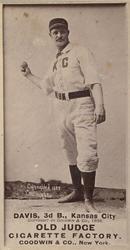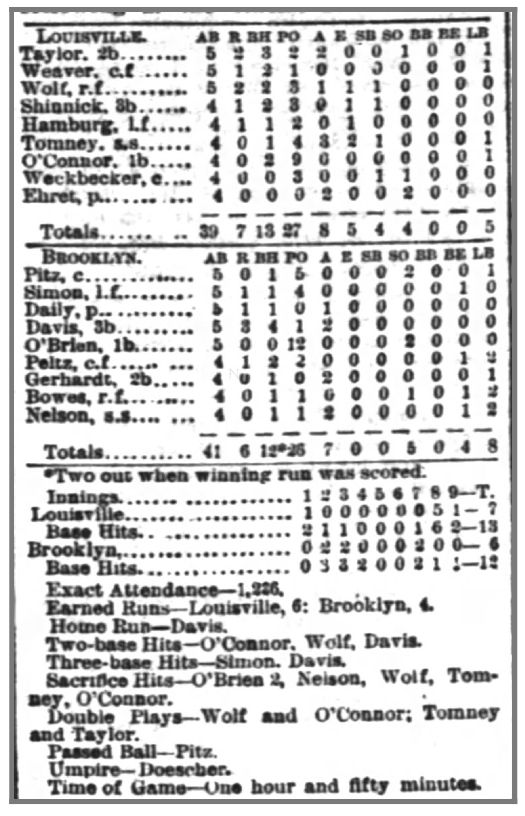July 18, 1890: Jumbo Davis hits for the cycle, but Brooklyn falls to Louisville in a walk-off
 A crowd of 1,236 turned out to watch the second-place Louisville Colonels (41-27) host the last-place Brooklyn Gladiators (20-47-1) at Eclipse Park, in an American Association matchup. The Colonels, often referred to as the Cyclones in the Louisville press, had been on a tear, winning 14 of 16 games since June 28, including a stretch of 12 straight at one point. All of these had been home games, too. Brooklyn had not been so fortunate. The Gladiators had been playing on the road since June 13. Although they had won four of their past six games, they had lost 17 of 20 games before that as the visiting team.
A crowd of 1,236 turned out to watch the second-place Louisville Colonels (41-27) host the last-place Brooklyn Gladiators (20-47-1) at Eclipse Park, in an American Association matchup. The Colonels, often referred to as the Cyclones in the Louisville press, had been on a tear, winning 14 of 16 games since June 28, including a stretch of 12 straight at one point. All of these had been home games, too. Brooklyn had not been so fortunate. The Gladiators had been playing on the road since June 13. Although they had won four of their past six games, they had lost 17 of 20 games before that as the visiting team.
This was the inaugural (and, unfortunately, only) season for the Brooklyn Gladiators. Brooklyn had fielded a team in the American Association1 since its inception in 1884, but in 1890 the Brooklyn Bridegrooms joined the National League (eventually becoming the Superbas and then the Dodgers). The new Gladiators gave the future New York City borough a second team, but it folded after a 26-73 record in 1890. Because of the Gladiators’ poor start and competition for fans with the Bridegrooms, the clubs in the American Association had consented that all four games scheduled to be played between Louisville and Brooklyn in New York were instead played in Kentucky.2 This was the first of those four.
Red Ehret, a 21-year-old Louisville native, had the mound duties for the home team. This was his breakout season in the American Association.3 Ed Daily, the “old League twirler,”4 was named starter for Brooklyn. Daily (“old” at 27 years) had been playing professional baseball since 1885, but had bounced around between four teams. When he wasn’t pitching, he was a regular member of Brooklyn’s outfield.
The fans were treated to a pregame set of festivities in which Louisville’s Jimmy “Chicken” Wolf was presented with “a box of cigars for his home run”5 which he clouted in a previous game. Wolf hit only four round-trippers for the season (and just 18 in his 11-season career). Wolf continued to garner praise from the fans when the game started. With two outs in the first, he drove the ball into left field for a double and scored when Tim Shinnick followed with a single to right.
In the second inning, Brooklyn tied the score when third baseman Jumbo Davis6 launched a leadoff home run into the left-field seats. An out later, John Peltz and Joe Gerhardt hit back-to-back singles. After Frank Bowes struck out, Candy Nelson grounded a ball to second baseman Shinnick, who failed to handle it cleanly, and Peltz scored the go-ahead run for Brooklyn on the error.
In the third Brooklyn added two more runs, on singles by Daily, Davis, Billy O’Brien, and Peltz.7 The Gladiators had now built a 4-1 advantage. It stayed that way until the seventh inning, when Hank Simon tripled. An out later, Davis also stroked a triple, driving in Simon. O’Brien’s flyout brought Davis home with the second tally of the inning, boosting the Brooklyn lead to 6-1.
Daily pitched magnificently until the eighth inning, when “the Cyclones let their willows go, and victory followed.”8 After Ehret struck out, Harry Taylor singled up the middle. Farmer Weaver lined a pitch to left field, but Simon misjudged the ball’s flight path, and it rolled by him. Taylor scored and Weaver wound up on third base. Wolf’s RBI single plated Weaver, and Shinnick banged a single, too. The two runners then successfully completed a double steal, putting runners at second and third, with still just one out. Charlie Hamburg drove in Wolf, but Hamburg injured himself sliding into second base and was replaced by Pete Weckbecker. A fly out by Phil Tomney brought Shinnick home, and Weckbecker scored when Dan O’Connor “swung his wagon tongue against the ball, and it went safe to left center.”9 Louisville had evened the score, 6-6. According to the Brooklyn Daily Eagle, all of the hits were “a series a scratch hits just outside the reach of the infielders.”10
In their final turn at bat, the Gladiators had an opportunity to win the game. With one out in the ninth, Davis knocked a double. O’Brien “hit a line ball that almost took little Tomney off his feet.”11 The Louisville shortstop held on, though, and then threw to Taylor at second for the inning-ending double play. Then as it often appears, a fine fielding play leads to a good at-bat. Taylor singled to start things in the bottom of the ninth. He advanced to third on Weaver’s single past short. Wolf drove a fly ball to the outfield for an out, but it was deep enough for Taylor to tag and score the winning run. The Cyclones had won in what would much later be styled a “walk-off.”
Taylor paced the Louisville victory with his 3-for-5 performance. He scored two runs as well. Ehret earned the victory and Daily took the loss.
Davis’s double gave him four hits for the game — a single, double, triple, and home run. With his “most noteworthy features of the game,”12 he had hit for the cycle. He added three runs scored to his 10 total bases. Davis became the third player in 1890 to hit for the cycle, joining the New York Giants’ Mike Tiernan (June 28 — his second career cycle) and the Toledo Maumees’ Bill Van Dyke (July 5). Four more players accomplished the rare feat after Davis in the 1890 season: the Giants’ Roger Connor (July 21), the Brooklyn Bridegrooms’ Oyster Burns (August 1), the Cincinnati Reds’ John Reilly (August 6 — his third career cycle) and the Louisville Colonels’ Farmer Weaver (August 12).
According to Louisville’s Courier-Journal, James “Jumbo” Davis enjoyed “the reputation of having played with every club in the country.”13 This is a bit of an exaggeration, but in truth, Davis had not stayed with any club too long. After a season with the Kansas City Cowboys in 1884, he did not play in the majors in 1885. He played for two seasons with the Baltimore Orioles (1886-87). Baltimore sold Davis back to the Cowboys in February 1888, but he was released by Kansas City on August 22, 1889.
The St. Louis Browns picked up his contract but then also released him in September 1889, when he was signed by the Brooklyn Bridegrooms. He didn’t stay long in Brooklyn (in fact, he didn’t appear in any games with the Bridegrooms), as the St. Louis Browns signed him on May 13, 1890, but they released Davis for the second time in less than a year on June 12, 1890.
He ended up back with Brooklyn, but this time, with the fledgling Gladiators. At age 28, Davis batted .303 for the Gladiators in 1890, hitting two home runs, two triples, and nine doubles in 38 games. He collected three of those 13 extra-base hits in this game. Davis appeared in just 12 games in 1891 for the Washington Nationals, playing the final game of his career on May 22.
The box score:14
(Click image to enlarge)
Sources
In addition to the sources mentioned in the Notes, the author consulted Baseball-Reference.com, MLB.com, Retrosheet.org, and SABR.org. There is no digital box score or play-by-play currently available.
Notes
1 The Brooklyn Atlantics played in 1884. They changed their name to the Grays in 1885 and then to the Bridegrooms in 1888.
2 “Had No Chance,” Brooklyn Daily Eagle, July 19, 1890: 1.
3 After going 10-29 with a 4.80 ERA in 1889, Ehret turned it around to win 25 games (losing 14), with a 2.53 ERA in 1890.
4 “A Close Call,” Courier-Journal (Louisville, Kentucky), July 19, 1890: 3.
5 Courier-Journal.
6 Davis was referred to in the papers as “Big Jim.”
7 “A Close Call.” The account of the game mentions four singles, but the box score shows only three Brooklyn hits for the third inning. In either case, two runs were scored.
8 “A Close Call.”
9 “A Close Call.”
10 “Had No Chance,” Brooklyn Daily Eagle.
11 “A Close Call.”
12 “Had No Chance.”
13 “A Close Call.”
14 “A Close Call.” This box score is from the Courier-Journal. The box score in the Brooklyn Daily Eagle has the two teams reversed. (It shows Brooklyn winning, 7-6).
Additional Stats
Louisville Colonels 7
Brooklyn Gladiators 6
Eclipse Park
Louisville, KY
Corrections? Additions?
If you can help us improve this game story, contact us.


